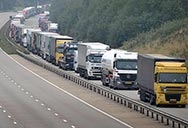
Lorries and buses should also contribute to less emissions and better air quality, say S&Ds
Date
Tue, 06/12/2018
Sections
Transport
Climate & Environment
The EU is committed to cut greenhouse gas emissions by at least 40% by 2030, and road transport must make a relevant contribution to this target. This is why today the plenary in Strasbourg will vote on a report drafted by S&D MEP Damiano Zoffoli aimed at reducing CO2 emissions from heavy-duty vehicles.
A system to monitor and report on CO2 emissions from, and fuel consumption of, new heavy-duty vehicles will be introduced in the EU in order to allow for the implementation of the measures comprised in the Mobility Package.
S&D MEP Damiano Zoffoli said:
“Road transport generates the greatest share of greenhouse gas emissions (72.8% in 2014) of all means of transport, with heavy-duty vehicles accounting for 5% of the total carbon dioxide emissions in the EU. So, the contribution of the road transport sector is crucial if we want to meet the Paris Climate goals.
“The Mobility Package now under negotiations provides some effective measures, but they will not be applicable without reliable data on fuel consumption and CO2 emissions. A system to monitor and collect such data already exists for cars and vans, but is still pending for lorries, buses and coaches.
“This information will also help hauliers and mainly small and medium-sized enterprises because they will be able to choose the most energy-efficient models. In addition, local public procurement could make smarter and cleaner purchases.”
S&D spokesperson on environment, Miriam Dalli MEP, said:
“Emissions from road transport, including CO2 emissions generated by trucks, need to curbed as soon as possible.
“In recent years, significant markets such as the US, Canada, Japan and China implemented certification and fuel efficiency measures to improve their emission standards. The European Union cannot lag behind.
“Having an EU monitoring and reporting scheme is just the first step. The final aim is to support the implementation of truck CO2 standards and come up with a procedure for the certification of CO2 emissions from new heavy-duty vehicles placed on the EU market.”

